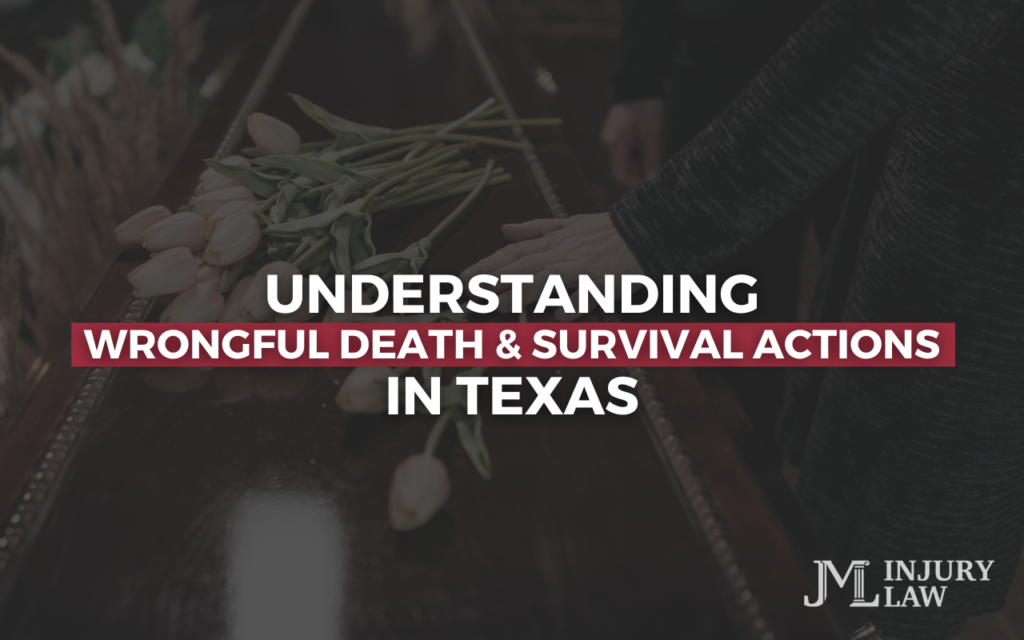Texas, like all states, has laws concerning wrongful death claims. Although the legal landscape can appear intricate, the underlying principle is straightforward: If someone’s wrongful actions result in the death of another person, the surviving family members can seek compensation (referred to as “damages”) for the harm they endure due to the loss. This article delves into Texas’s wrongful death statute and also explores a related legal remedy known as a “survival” action. If you’ve lost a loved one due to someone else’s negligence, it’s critical to understand the Texas wrongful death laws and have an experienced wrongful death attorney who can act in your favor.
What Is “Wrongful Death” in Texas?
In Texas, a “wrongful death” happens when:
- An injury results in the death of an individual or the failure of a fetus to be born alive.
- The injury stems from the “wrongful act, neglect, carelessness, unskillfulness, or default” of another individual or entity.
- The injured individual would have had the right to pursue a personal injury lawsuit if they had survived or been born alive.
Personal injury claims, like wrongful death lawsuits, can stem from various events, encompassing a wide range of circumstances, such as:
- Negligence-related incidents like car accidents, defective products, and unsafe premises
- Cases of medical malpractice
- Acts done intentionally (including criminal actions)

Exploring the Contrast Between Criminal Homicide and Wrongful Death Cases
Identical circumstances can result in both a criminal homicide trial and a wrongful death lawsuit. A prime example is the O.J. Simpson case. Simpson was cleared of murder allegations in the unfortunate deaths of Nicole Brown Simpson and Ron Goldman. Yet, in a subsequent wrongful death lawsuit, he was ordered to provide compensation to the families of Brown Simpson and Goldman.
The Standard of Proof
A significant distinction between a criminal homicide case and a wrongful death case lies in the standard of proof required. In a homicide case, the prosecution must prove the accused’s guilt “beyond a reasonable doubt,” the most stringent standard in law.
Conversely, in a wrongful death case, the burden of proof is notably lighter. The plaintiff is tasked with demonstrating the defendant’s liability by a “preponderance of the evidence.” Here, the plaintiff, who initiates the lawsuit, only needs to show that it is slightly more likely than not that the defendant, the party being sued, was responsible for the death.
The Penalty
In a wrongful death case, a successful outcome results in the court mandating the defendant to compensate the surviving family members of the deceased. Conversely, in a successful criminal prosecution, common penalties comprise incarceration, fines remitted to the state, or probation.
Distinguishing Between a Wrongful Death Case and a Survival Case
Wrongful death and survival actions are commonly filed jointly, as they stem from a shared cause: an injury resulting in death. We will delineate the distinctions between these legal actions. As a quick tip, consider this simple shorthand to aid in understanding:
- A survival action compensates for the deceased person’s injuries from the time of injury until death, while
- A wrongful death suit compensates for the survivors’ injuries from the date of death onwards.
What a Wrongful Death Action Covers
A wrongful death lawsuit compensates the surviving relatives for the harm they endure due to the deceased’s passing. For instance, they often seek reparation for the lost financial contributions and support they would have received from the deceased if they were alive. The damages are awarded for the suffering of the survivors, not the injuries of the deceased.
What a Survival Action Covers
A survival action refers to a claim that the deceased individual could have pursued to seek damages for their personal injuries if they had survived. This legal recourse can be initiated by the survivors or the estate of the deceased.
For instance, in a scenario where the deceased suffered severe injuries in a car accident and succumbed two weeks later, a survival action seeks recompense for the damages incurred during the period between the injury and the passing. These damages encompass various aspects such as medical expenses, lost wages, physical pain, emotional distress, and other related losses.
Frequently Asked Questions
Who is Eligible to Pursue a Wrongful Death Lawsuit in Texas?
In Texas, specific eligibility criteria must be met to file a wrongful death claim. To proceed with a wrongful death claim in Texas, you need to satisfy at least one of the following conditions:
- You are the surviving spouse.
- You are a surviving child (adult or minor).
- You are the surviving parent(s).
- You are a legally adopted child of the deceased.
- You are the surviving adoptive parent(s).
- You are the personal representative of the estate of the deceased.
It is crucial to reiterate that a wrongful death claim falls under civil law. You have the right to pursue a wrongful death claim independently of any criminal charges brought against the defendant.
What Kinds Of Compensation Can Be Sought In A Texas Wrongful Death Lawsuit?
In a Texas wrongful death case, compensation is granted to the surviving spouse, children, and parents of the deceased to cover their losses resulting from the death. These damages can address various injuries that the survivors may endure, such as:
- lost income or other financial support
- the value of lost household services the deceased would have provided
- mental pain and anguish experienced by the survivors
- lost love, companionship, comfort, and society, and
- the value of any lost savings or inheritance.
Moreover, in a Texas wrongful death lawsuit, exemplary damages (also known as “punitive damages”) may be granted, but solely if the death resulted from a “wilful act or omission or gross negligence” (Tex. Civ. Prac. & Rem. Code § 71.009 (2023)). These damages are not meant to compensate the family for death-related losses but rather to penalize the offender and discourage others from similar misconduct.
What Is The Deadline For Initiating A Wrongful Death Lawsuit In Texas?
There is a specific time limit for filing all personal injury cases in court, which includes wrongful death lawsuits. This time limit is known as the “statute of limitations.” In Texas, the statute of limitations for wrongful death is two years from the individual’s date of passing.
If you intend to pursue a wrongful death lawsuit in Texas, you must initiate the legal proceedings within the two-year timeframe. If you attempt to file a lawsuit after the expiration of the statute of limitations, the court will likely have no option but to dismiss your case.
Contact Our Texas Wrongful Death Lawyer Today
If you’ve experienced the loss of a loved one due to wrongful death in Texas, seeking legal assistance is crucial. A seasoned wrongful death attorney can guide you through the daunting task of establishing fault, easing the emotional strain. Proficient in legal matters, a wrongful death lawyer can aid in investigating the incident, gathering pertinent evidence, consulting experts for accurate compensation assessment, initiating the claim process, and negotiating with insurers. Contact JML Injury Law today to schedule a free consultation and learn more about how we can help.







